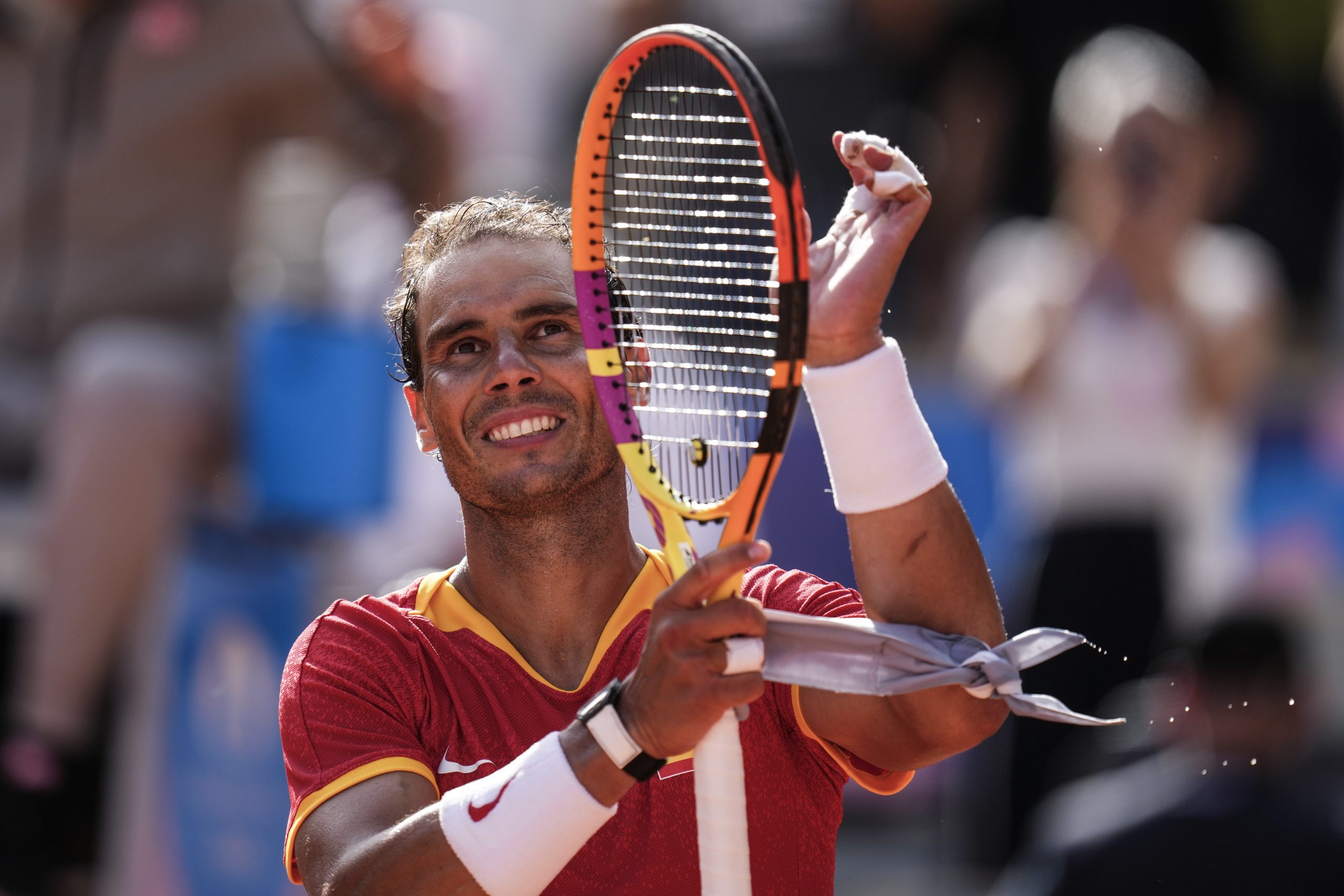PARIS — The fans’ first standing ovation for Rafael Nadal occurred when he wasn’t even in their presence, merely an image shown on a video screen as he waited in a stadium hallway to walk out on the court used for the Paris Olympics and the French Open, a tournament he made his domain.
[time-brightcove not-tgx=”true”]
They stayed on their feet, some applauding, some raising their phones to capture images of the moment when he emerged and stepped on the red clay so familiar to him. Chants of “Ra-fa! Ra-fa!” rang out at various times, and plenty of red-and-yellow Spanish flags flapped in the stands, as Nadal beat Marton Fucsovics of Hungary 6-1, 4-6, 6-4 in the first round Sunday to set up a blockbuster showdown against rival Novak Djokovic at the Summer Games.
“His fighting spirit is at the top, still,” Fucsovics said about the 38-year-old Nadal. “He is not at his best level (of) playing. But if he has a good day, he can beat anybody.”
Nadal made a last-minute decision to remain in the singles bracket, a day after he won in doubles with partner Carlos Alcaraz and said he wasn’t sure if he would participate in both events.
Not only did Nadal play Sunday, but for stretches, particularly in the early going and in crunch time down the stretch, he played very much like a version of himself everyone is used to seeing: the sprinting, sliding, grunting star who owns 22 Grand Slam trophies in all and won Olympic gold medals for Spain in singles in 2008 and doubles in 2016.
And the crowd loved it. “It was a pleasure,” Fucsovics said, “to play against Rafa.”
There was no way to know at the outset, of course, whether this might be Nadal’s last singles match at these Olympics … or in this stadium that has meant so much to his career (and vice versa) … or, indeed, anywhere. He’s been rather coy lately on the subject of his retirement, even after saying in 2023 that he figured 2024 would be it for him.
Nadal has dealt with a series of injuries the past two seasons, including hip surgery in 2023, and his right thigh was taped Sunday. He needed a finger on his right hand treated by a trainer in the third set.
But after going through a morning practice session to test his fitness, he made the call to play, about 18 1/2 hours after Nadal and Alcaraz — Spain’s old-and-new pairing of tennis superstars — won the first match they’ve ever played together as a doubles team.
Nadal has not made clear whether this will be the last event of his storied career, although there’s been plenty of speculation it will be.
In the second round, Nadal will face Djokovic, a 37-year-old from Serbia. It will be their 60th matchup, more than any other two men have played against each other in the Open era, which began in 1968. Djokovic leads the head-to-head series 30-29.
Djokovic’s 24 Grand Slam titles make him the only man in tennis history with more than Nadal.
When Nadal and Fucsovics began warming up under a blue sky with a hint of a breeze, there were shouts of “Ole!” Spectators rose from their seats when Nadal jumped out to a 3-0 lead after just 13 minutes en route to taking the first set against an overmatched Fucsovics, a 32-year-old who is ranked 83rd.
Nadal did not look like someone ready to be done, not at all, particularly at the beginning of the match. In the second game, Nadal sprinted, then slid, to deliver a stinging cross-court backhand that won a point and elicited some gasps from the audience.
That, truly, is what it felt like: an audience fascinated with viewing, and appreciating, a performance by someone whose oeuvre is so well-known. The chase-every-ball relentlessness. The bullwhip of a lefty forehand with an over-his-head finishing pose. The grunts of exertion that punctuate so many racket swings.
Fucsovic’s career resume is no match for Nadal’s, naturally. Fucsovic has reached one Grand Slam quarterfinal, at Wimbledon in 2021, and exited in the first round of each major tournament so far this season.
Nadal, actually, is without a Slam match win in 2024, too. He missed the Australian Open in January because of a hurt hip muscle near where his operation was, bowed out in the first round of the French Open in May against eventual runner-up Alexander Zverev, then sat out Wimbledon in July because he wanted to avoid needing to prepare to play on the grass courts there before switching back to clay for the Olympics.
After Nadal raced through the opening set, things slowed down a bit for him. Suddenly, it was Fucsovics who was dictating baseline exchanges, especially with his own booming forehand. Nadal’s shots, meanwhile, lost some of their usual verve.
Eventually, to no one’s surprise, the muscle memory kicked in for Nadal.
A key sequence came with Nadal serving while down 2-1 in the third set. He fell behind love-40, giving Fucsovics a trio of break points. But Nadal buckled down, won the next five points — the last with a forehand winner — to hold for 2-all, then got a break himself in the very next game for a lead he would never relinquish.
At the ensuing changeover, a trainer was called to the court to apply tape to the ring finger on Nadal’s right hand. He plays as a lefty but uses his right hand to hit his two-fisted backhand.
“I had a chance in the third set … but then he played very solid, very aggressive,” Fucsovics said.
Nadal needed to save yet another break point in the following game but did, and he led 4-2.
Soon enough, he was smacking one last forehand winner, then raising both arms with fists clenched. Now will come a tougher test against Djokovic, one that is sure to draw a ton of attention.

